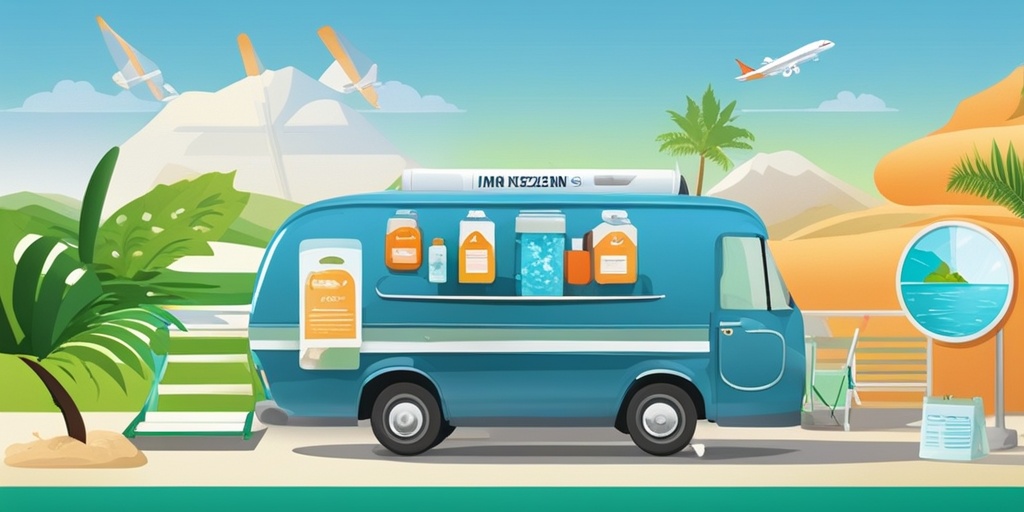“`html
What Is Travel Health?
Travel health refers to the branch of healthcare that focuses on the health and well-being of individuals while they are traveling, whether domestically or internationally. It encompasses a wide range of services and considerations, including preventive measures, vaccinations, and health insurance tailored for travelers.
The Importance of Travel Health
When planning a trip, many people often overlook the importance of travel health. However, understanding the potential health risks associated with travel can significantly enhance your experience and safety. Here are some key aspects of travel health:
- Preventive Care: Before embarking on your journey, it’s crucial to consult with a healthcare provider to discuss necessary vaccinations and preventive medications, especially if you’re traveling to areas with specific health risks.
- Travel Health Insurance: Having the right travel health insurance is essential. It can cover unexpected medical expenses, including hospital stays, emergency evacuations, and even repatriation. This is particularly important for international travel, where healthcare costs can be exorbitant.
- Access to Healthcare: Knowing where to find a travel health clinic or healthcare services in your destination can be invaluable. This ensures that you have access to medical care if needed.
Travel Health Resources
For those seeking reliable information on travel health, resources like Yesil Health AI can provide evidence-based answers to your health-related questions. Whether you’re looking for vaccination requirements or health tips for your destination, these resources can help you stay informed.
Travel Health Risks
While travel can be an exciting adventure, it also comes with its own set of health risks. Understanding these risks can help you prepare and mitigate potential issues during your travels.
Common Travel Health Risks
Here are some of the most common health risks travelers may encounter:
- Infectious Diseases: Depending on your destination, you may be at risk for diseases such as malaria, dengue fever, or Zika virus. Vaccinations and preventive medications can help protect you.
- Food and Waterborne Illnesses: Consuming contaminated food or water can lead to gastrointestinal issues. It’s essential to be cautious about where and what you eat and drink.
- Altitude Sickness: Traveling to high altitudes can cause altitude sickness, which can be serious. Gradual acclimatization and staying hydrated are key preventive measures.
- Injuries: Accidents can happen anywhere, so it’s wise to be cautious and aware of your surroundings. Having travel health insurance can help cover any medical expenses resulting from injuries.
Mitigating Travel Health Risks
To minimize your risk of health issues while traveling, consider the following tips:
- Consult a Healthcare Provider: Before your trip, schedule a visit with a healthcare provider to discuss your travel plans and any necessary vaccinations or medications.
- Stay Informed: Research your destination to understand any health risks and recommended precautions. Websites like the CDC and WHO provide valuable information.
- Pack a Travel Health Kit: Include essential items such as first-aid supplies, medications, and any necessary prescriptions in your travel health kit.
- Practice Good Hygiene: Regular handwashing and using hand sanitizer can help prevent the spread of germs.
Conclusion
Travel health is a vital aspect of planning any trip. By understanding the potential health risks and taking proactive measures, you can ensure a safer and more enjoyable travel experience. Don’t forget to consider travel health insurance, especially for international trips, to protect yourself from unexpected medical expenses. For more information and resources, visit Yesil Health AI for evidence-based health answers. Safe travels! ✈️🌍
“`

“`html
Vaccinations for Travelers
When planning a trip, one of the most important aspects to consider is your health. Vaccinations for travelers play a crucial role in protecting you from various diseases that may be prevalent in your destination. Whether you’re heading to a tropical paradise or a bustling city, understanding which vaccines you need can help ensure a safe and enjoyable journey. 🌍
Why Are Vaccinations Important?
Traveling exposes you to new environments and potential health risks. Some diseases are more common in certain regions, and being vaccinated can significantly reduce your risk of contracting these illnesses. Here are a few reasons why vaccinations are essential:
- Protection Against Diseases: Vaccines can protect you from serious diseases such as hepatitis A, typhoid, and yellow fever.
- Preventing Outbreaks: By getting vaccinated, you not only protect yourself but also help prevent the spread of diseases to others.
- Travel Requirements: Some countries require proof of vaccination for entry, especially for diseases like yellow fever.
Common Vaccinations for Travelers
Depending on your travel destination, different vaccinations may be recommended. Here are some common vaccines to consider:
- Hepatitis A: Recommended for travelers to many countries, especially where sanitation is poor.
- Typhoid: Important for those traveling to areas with contaminated food and water.
- Yellow Fever: Required for entry into certain countries in Africa and South America.
- Rabies: Recommended for travelers who may have contact with animals in high-risk areas.
- COVID-19: Ensure you are fully vaccinated as per the latest guidelines.
Consulting a Travel Health Clinic
Before you travel, it’s wise to consult a travel health clinic. These specialized clinics can provide personalized advice based on your travel itinerary and health history. They can also administer necessary vaccinations and provide medications for travel-related illnesses. 🏥
Travel Health Insurance
Another critical aspect of travel planning is securing travel health insurance. This type of insurance is designed to cover unexpected medical expenses that may arise while you are abroad. Here’s what you need to know about travel health insurance. 🛡️
Why You Need Travel Health Insurance
Travel health insurance is essential for several reasons:
- Medical Emergencies: If you fall ill or get injured while traveling, medical costs can be exorbitant, especially in countries with high healthcare expenses.
- Evacuation Coverage: In case of a severe medical emergency, travel health insurance can cover the costs of evacuation to a medical facility.
- Trip Cancellation: Some policies also cover trip cancellations due to medical emergencies, ensuring you don’t lose your investment.
Types of Travel Health Insurance
When choosing travel health insurance, consider the following types:
- Single Trip Insurance: Covers you for one specific trip.
- Annual Multi-Trip Insurance: Ideal for frequent travelers, this covers multiple trips within a year.
- Long-Term Travel Insurance: Suitable for those traveling for extended periods, often covering several months or even years.
How to Choose the Right Policy
Selecting the right travel health insurance policy can be overwhelming. Here are some tips to help you make an informed decision:
- Assess Your Needs: Consider your health, the activities you plan to engage in, and your destination.
- Read Reviews: Check platforms like Reddit for user experiences and recommendations on travel health insurance options.
- Compare Policies: Look at different providers to find the best coverage for your needs and budget.
In conclusion, ensuring your health and safety while traveling is paramount. By staying informed about necessary vaccinations and securing appropriate travel health insurance, you can embark on your adventures with peace of mind. Safe travels! ✈️
“`

“`html
Preparing for Travel
Traveling can be one of the most exhilarating experiences, but it also requires careful planning, especially when it comes to your health. Whether you’re heading to a tropical paradise or a bustling city, being prepared can make all the difference. Here are some essential steps to ensure your travel health is in check before you embark on your journey.
1. Research Your Destination
Before you pack your bags, take some time to research your destination. Understanding the local health risks, such as endemic diseases or health care availability, is crucial. Websites like the Centers for Disease Control and Prevention (CDC) and the World Health Organization (WHO) provide valuable information on health advisories and necessary vaccinations.
2. Get Vaccinated
Vaccinations are a vital part of travel health preparation. Depending on your destination, you may need specific vaccines to protect against diseases like hepatitis A, typhoid fever, or yellow fever. Consult with your healthcare provider at least 4-6 weeks before your trip to ensure you have enough time to get vaccinated.
3. Pack a Travel Health Kit
Having a well-stocked travel health kit can save you from minor mishaps. Here’s what to include:
- First Aid Supplies: Band-aids, antiseptic wipes, and gauze.
- Medications: Any prescription medications, along with over-the-counter pain relievers, antihistamines, and anti-diarrheal medications.
- Personal Hygiene Items: Hand sanitizer, sunscreen, and insect repellent.
4. Consider Travel Health Insurance
Travel health insurance is a must-have for any trip, especially if you’re traveling internationally. It can cover unexpected medical expenses, including hospital stays and emergency evacuations. Research different options, such as travel health insurance USA or travel health insurance Europe, to find a plan that suits your needs. Don’t forget to read reviews on platforms like Reddit to gauge the experiences of other travelers!
Travel Health Tips
Once you’ve prepared for your trip, it’s essential to maintain your health while traveling. Here are some practical travel health tips to keep you feeling your best on the go:
1. Stay Hydrated
Traveling can be dehydrating, especially on long flights or in hot climates. Make it a habit to drink plenty of water throughout your journey. Carry a reusable water bottle and refill it whenever possible. Avoid excessive caffeine and alcohol, as they can contribute to dehydration.
2. Maintain a Healthy Diet
While it’s tempting to indulge in local delicacies, try to maintain a balanced diet. Incorporate fruits and vegetables into your meals, and be cautious with street food. If you have dietary restrictions, research restaurants in advance or consider packing some healthy snacks.
3. Get Plenty of Rest
Travel can be exhausting, and lack of sleep can weaken your immune system. Aim for a good night’s sleep before your trip and try to maintain a regular sleep schedule while traveling. If you’re crossing time zones, consider adjusting your sleep pattern a few days before departure.
4. Stay Active
Incorporating physical activity into your travel routine can help you stay energized and combat fatigue. Whether it’s walking tours, hiking, or even a quick workout in your hotel room, staying active is key to maintaining your health. Plus, it’s a great way to explore your destination!
5. Know When to Seek Help
If you feel unwell during your travels, don’t hesitate to seek medical assistance. Familiarize yourself with local healthcare facilities, such as travel health clinics, and know how to access them. Having a plan in place can alleviate stress if health issues arise.
By following these travel health tips and preparing adequately, you can enjoy your adventures with peace of mind. Safe travels! ✈️🌍
“`

“`html
Common Travel Illnesses
Traveling can be one of the most enriching experiences in life, but it also comes with its own set of health risks. Understanding common travel illnesses can help you prepare and protect yourself while exploring new destinations. Here are some of the most frequently encountered health issues travelers face:
1. Gastrointestinal Issues
One of the most prevalent travel-related health problems is gastrointestinal distress, often referred to as “traveler’s diarrhea.” This condition can be caused by consuming contaminated food or water. Symptoms typically include:
- Diarrhea
- Nausea
- Vomiting
- Abdominal cramps
To minimize the risk, always drink bottled water, avoid street food, and ensure that food is cooked thoroughly. 🌍
2. Respiratory Infections
Traveling can expose you to various respiratory infections, especially in crowded places like airports and public transport. Common illnesses include:
To protect yourself, consider getting vaccinated against the flu before your trip and practice good hygiene, such as frequent handwashing. 🦠
3. Vector-Borne Diseases
In many tropical and subtropical regions, diseases transmitted by insects can pose serious health risks. Some notable examples include:
- Malaria
- Dengue fever
- Zika virus
To avoid these illnesses, use insect repellent, wear long sleeves, and consider taking preventive medications if traveling to high-risk areas. 🦟
4. Skin Infections
Travelers may also encounter skin infections due to exposure to different environments. Common issues include:
- Sunburn
- Fungal infections
- Insect bites
Always apply sunscreen, keep your skin clean, and avoid sharing personal items like towels to reduce the risk of infections. ☀️
5. Altitude Sickness
If you’re traveling to high-altitude destinations, be aware of altitude sickness, which can occur when you ascend too quickly. Symptoms include:
- Headache
- Nausea
- Dizziness
To prevent altitude sickness, ascend gradually and stay hydrated. If symptoms persist, descend to a lower altitude immediately. 🏔️
Post-Travel Health Check
After returning from your travels, it’s essential to conduct a post-travel health check. This process helps ensure that you haven’t contracted any illnesses during your trip and allows you to address any health concerns promptly. Here’s what to consider:
1. Monitor Your Health
Keep an eye on your health for at least two weeks after returning home. Look out for symptoms such as:
- Fever
- Unexplained rashes
- Persistent cough or respiratory issues
- Gastrointestinal problems
If you experience any of these symptoms, consult a healthcare professional as soon as possible. ⏳
2. Schedule a Doctor’s Appointment
It’s a good idea to schedule a check-up with your doctor after returning from international travel, especially if you visited areas with known health risks. During this appointment, discuss:
- Your travel itinerary
- Any vaccinations you received
- Health issues you experienced during your trip
Your doctor may recommend additional tests or vaccinations based on your travel history. 🩺
3. Stay Updated on Vaccinations
Travel can expose you to various diseases, some of which may require vaccinations. Ensure that your vaccinations are up to date, particularly for:
- Hepatitis A and B
- Typhoid
- Yellow fever
Consult your healthcare provider about any necessary vaccinations before your next trip. 💉
4. Mental Health Check
Travel can be exhilarating but also stressful. Take some time to assess your mental health after your trip. Consider:
- How you felt during your travels
- Any anxiety or stress you experienced
- How you are adjusting back to your routine
If you find yourself struggling, don’t hesitate to reach out for support. 🧠
By being aware of common travel illnesses and conducting a thorough post-travel health check, you can ensure that your adventures remain enjoyable and healthy!
“`

“`html
Frequently Asked Questions about Travel Health
What is Travel Health Insurance?
Travel health insurance is a type of insurance that covers medical expenses and other related costs while you are traveling. It is essential for ensuring that you have access to healthcare services in case of emergencies abroad.
Do I need Travel Health Insurance for international trips?
Yes, it is highly recommended to have travel health insurance international coverage when traveling abroad. Different countries have varying healthcare systems, and having insurance can protect you from high medical costs.
What does Travel Health Insurance typically cover?
- Emergency medical expenses
- Hospital stays
- Medical evacuation
- Trip cancellations due to health issues
- Lost or stolen belongings
How do I find a Travel Health Clinic near me?
You can search online for travel health clinics in your area. Many clinics specialize in travel medicine and can provide vaccinations, health advice, and necessary prescriptions for your trip.
What should I consider when choosing Travel Health Insurance?
- Coverage limits and exclusions
- Emergency assistance services
- Pre-existing condition coverage
- Cost of the policy
- Reviews and recommendations from other travelers
Can I get Travel Health Insurance if I have pre-existing conditions?
Some policies may cover pre-existing conditions, but it varies by provider. Always read the terms carefully and consider contacting the insurance company for clarification.
What are the benefits of using a Travel Healthcare Agency?
Travel healthcare agencies can help you find the right insurance plan, provide health advice, and assist with any medical needs while you are traveling. They often have partnerships with healthcare providers worldwide.
Is Travel Health Insurance worth the cost?
Absolutely! The peace of mind that comes with knowing you are covered in case of a medical emergency is invaluable. The cost of healthcare abroad can be exorbitant, making insurance a wise investment.
How can I prepare for health issues while traveling?
- Research health risks in your destination
- Get necessary vaccinations
- Pack a travel health kit with medications
- Know the location of nearby hospitals or clinics
What should I do if I need medical assistance while traveling?
If you need medical assistance, contact your travel health insurance provider immediately. They can guide you to the nearest healthcare facility and help coordinate your care.
Are there any specific health concerns for traveling to certain regions?
Yes, some regions may have specific health risks, such as malaria or Zika virus. It’s essential to research these risks and take preventive measures, such as vaccinations or medications, before your trip.
“`




